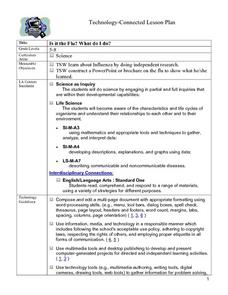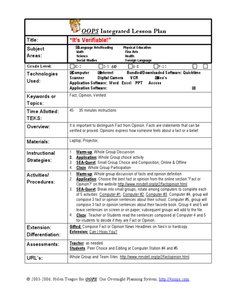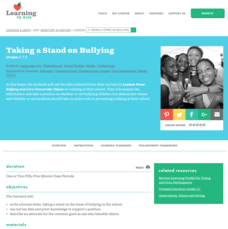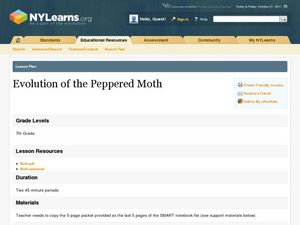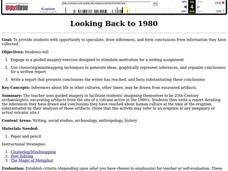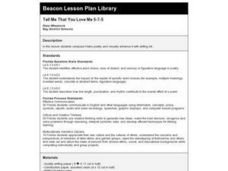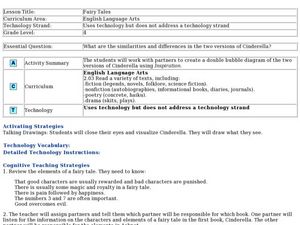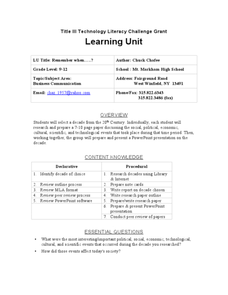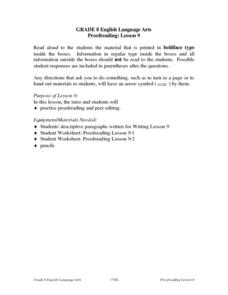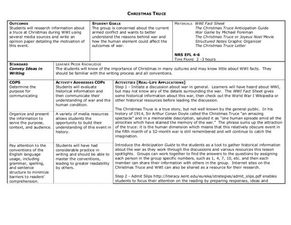Curated OER
Is It The Flu? What Do I Do?
Students use the internet to research the flu. Using various websites, they identify who should get flu shots, how to protect themselves and guidelines for getting over the flu. They write a one page report on their findings to end the...
Curated OER
Treating Substance Abuse Problems
Students conduct an open discussion on the legal, social, and health consequences associated with substance abuse. Working in pairs, students discuss the effects of substance abuse and brainstorm possible solutions. Independently,...
Curated OER
"It's Verifiable!"
Students examine the differences between fact and opinion. They define fact and opinion, evaluate their favorite fact or opinion on a website, and in small groups write sentences using facts and opinions about school and their favorite...
Curated OER
The Harlem Renaissance
Students locate Harlem on a city map of New York City. As a class, they are given information and take notes on the Harlem Renaissance. They are read two poems by different authors and write a paragraph about what they believe it means....
Curated OER
Service Learning Project-American Civil War
Tenth graders study the American Civil War. As part of a service learning project, they volunteer to help preserve or promote a local Civil War site. They conduct research and write letters or lobby legislatures on behalf of historic...
Curated OER
Wilderness Lesson Plan
Young scholars investigate the wilderness by reading magazine articles and discussing with their peers. In this wild life lesson, students read a page from the Natural Inquirer magazine and examine photographs online of wilderness...
Curated OER
Keyboard Buddies in my Community
Second graders utilize Microsoft Word to create stationery and letters to send to other children in their school building, expressing experiences in their daily lives. As the unit progresses, they create documents to send to other second...
Curated OER
Taking a Stand on Bullying
Middle schoolers stand up against bullying in a character-building instructional activity. After discussing historical figures who became advocates in times of adversity, they brainstorm ways to end bullying at their own school, and use...
Code.org
Digital Assistant Project
Scholars apply previously learned skills to create a functional computer program. They produce a digital assistant incorporating string commands and complex conditional logic.
Curated OER
Evolution of the Peppered Moth
Seventh graders complete a timeline about the evolution of the peppered moth. In this biology lesson, 7th graders write an essay about how human can affect evolution. They share their essay with the class.
Curated OER
The Important Things About Nouns
Young scholars review nouns by observing a Nouns PowerPoint and write nouns using handheld computers. They listen to Margaret Wise Brown's, The Important Book as a model for a class e-book about nouns which they publish.
Curated OER
Camp Newspaper
Fifth graders write newspaper articles about Camp Campbell. They discuss the vocabulary of news stories, read examples, brainstorm ideas, and choose a topic before writing the article. After editing the articles, they word process them...
Curated OER
County Chronicles
Students review and use the information from previous lessons about their county. In groups, they write articles for various sections of a class newspaper. They review and edit each others work and publish their newspaper using a desktop...
Curated OER
Rate Your Plate
Third graders analyze the nutrients, calories, and food groups using the USDA CNPP website Interactive Healthy Eating Index. They write a summary of their personal findings related to their eating habits - including some ways to improve...
Curated OER
Who's for Dinner?
Fifth graders examine life systems within different biomes. They choose paper plates with the names of animals on them. They research the animals, write reports and draw pictures of them. They create a food chain model by arranging the...
Curated OER
Looking Back to 1980
Pupils use clustering/mind mapping techniques to generate ideas, graphically represent inferences, organize their conclusions and write a report that presents conclusions the writer has reached, and facts substantiating those conclusions.
Curated OER
Tell Me That You Love Me 5-7-5
Young scholars listen to several examples of Haiku poetry and discuss the strict format. Then students create and edit their own Haiku poems and enhance them with ink designs.
Curated OER
Fairy Tales
Pupils investigate the characteristics of fairy tales and create and edit their own stories. their work is formatted into a storyboard and shared with their classmates.
Curated OER
Studies of the Eastern Worlds: Historical Summaries
Seventh graders interpret their own meaning of the painting, "Christ's Descent into Hell" by Hieronymus Bosch and the song "We Didn't Start the Fire" by Billy Joel. They focus on the chaos created in both the art and music and discuss...
Curated OER
Remember When?
Students work in cooperative groups to research life in a decade of the 20th century. Each group member writes a 7-10 page paper highlighting the social, political and cultural events and the group presents a Powerpoint presentation to...
Curated OER
Proofreading: Lesson 9
Eighth graders participate in writing a descriptive paragraph with a main idea and supporting details. They generate correct mechanics and spelling while writing this paragraph. When finished, they complete a rubric (that is included...
Curated OER
Managing Medical Conditions
Twelfth graders discover more about a medical condition that is of interest to them and write what they have learned about that condition, using the information as a personal resource or to share with others.
Curated OER
Christmas Truce
Students research the Christmas truce during World War I. In this social studies lesson, students discuss World War I and the Christmas Truce. Students write a response about the truce.
Curated OER
Simple Past and Present Progressive
Students review the past and progressive verb tenses. Working in pairs, students identify the past and progressive tenses in their biographical writing. After picking a card, students act out a verb in either the past or progressive tense.


